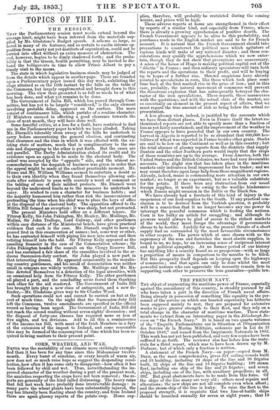TOPICS OF TIIE DAY.
THE SESSION.
THAT the Parliamentary session must needs extend beyond the average limit, might have been inferred from the materials sup- plied by Mr. Gladstone's Budget speech. A scheme so large, so novel in many of its features, and so certain to excite intense op- position from a party not yet destitute of organization, could not be carried into effect without an extra measure of obstruction. The end, however, begins to be dimly shadowed forth ; and the proba- bility is that the Queen, health permitting, may be invited to dis- band the belligerents in time to allow Prince Albert to pay a timely visit to the moors.
The state in which legislative business stands may be judged of from the details which appear in another page. These are founded upon a Parliamentary paper issued this day week, exhibiting the stage attained as on the 16th instant by the bills on the table of the Commons, but largely supplemented and brought down to this morning. The view thus presented is as full as needs be of what has been done, and what yet remains to be done.
The Government of India Bill, which has passed through Com- mittee, but has yet to be largely "considered," is the only element involving probable delay, apparent on the surface. The mass consist of continuance bills, which partake of a routine character. If Ministers succeed in effecting a good clearance towards the close of next month, they will have done well. Some fanciful critics, at a loss for a fault, have contrived to find one in the Parliamentary paper to which we have alluded. Taking Mr. Disraeli's tolerably clean sweep of the bills he undertook to carry before encountering the general election, and contrasting that clearance and the time in which it was effected with the ex- isting state of matters, much that is complimentary to the one side and disparaging to the other is put forth. But the cases are not parallel. The Derby Administration staked its credit and its existence upon an appeal to be made to the electoral body. The ordeal was accepted by the " opposite " side, and the utmost ac- commodation for the despatch of business was given in order that the appeal might be made at the earliest practicable moment. Mr. Hume and Mr. William Williams seemed to entertain a doubt as to their own identity when they found themselves allowing esti- mate after estimate to pass with scarcely a word of comment or the tabling of one of their mildest protests. Mr. Disraeli went beyond the understood limits as to the measures he undertook to carry. He wished to earn a character for business habits ; and the majority humoured him rather than risk the inconvenience of protracting the time when his chief was to place the keys of office at the disposal of the electoral body. The opposition offered to the Militia Bill formed an exception : it was sharp but not protracted.
The present Ministers hold office on a different tenure. Sir Fitzroy Kelly, Sir John Pakington, Mr. Henley, Mr. Mullings, Mr. Melina, Sir John Trollope' Lord Galway, and other gentlemen within easy distance of the Ministerial bench, have given practical evidence that such is the case. Mr. Disraeli ought to have ap- peared first in this enumeration of names ; but, some way or other, he has contented himself with piping his men into action and then retiring himself into the hold. Sir Fitzroy Kelly appeared as the assailing financier in the case of the Commutation scheme ; Sir John Pakington headed the assault on the Clergy Reserve Bill, and has sustained a fair share of the casualties involved in the ar- duous Succession-duty contest. Sir John played :a new part in that interesting drama. He appeared occasionally as the moraliz- ing country gentleman, and his scroll of denunciation was neither small in compass nor widely written. Mr. Mailings and Mr. Me- lina devoted themselves to a detection of the legal atrocities, with an occasional help from Sir Fitzroy Kelly. The other gentlemen all played a part, and the concluding scene found them thanking each other for the aid rendered. The Government of India Bill has brought into play a new class of antagonists and a new de- fender,----Mr. Gladstone gives way to Sir Charles Wood. Such operations could not and cannot be carried on but at the cost of much time. On the night that the Succession-duty Bill left the Commons' twelve amendments are specified in the official record as having been urged. The Government of India Bill did not reach the second reading without seven nights' discussion ; and the disposal of forty-one clauses has required more or less of five nights, and ten divisions. Add to all this a reminiscence of the Income-tax Bill, with most of the Irish Members in a fury at the extension of the impost to Ireland, and some reasonable idea may be formed of the consumption of time which has been re- quired to bring matters to their present point.


































 Previous page
Previous page